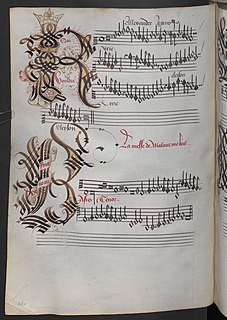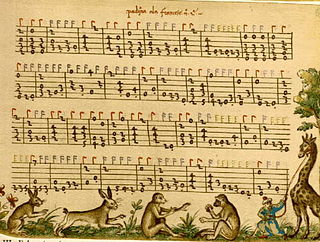Related Research Articles

Josquin des Prez, often referred to simply as Josquin, was a French composer of the Renaissance. He was the most famous European composer between Guillaume Dufay and Giovanni Pierluigi da Palestrina, and is usually considered to be the central figure of the Franco-Flemish School. Josquin is widely considered the first master of the high Renaissance style of polyphonic vocal music that was emerging during his lifetime.
Nicolas Gombert was a Franco-Flemish composer of the Renaissance. He was one of the most famous and influential composers between Josquin des Prez and Palestrina, and best represents the fully developed, complex polyphonic style of this period in music history.

Antoine Busnois was a French composer and poet of the early Renaissance Burgundian School. While also noted as a composer of motets and other sacred music, he was one of the most renowned 15th-century composers of secular chansons. He was the leading figure of the late Burgundian school after the death of Guillaume Dufay.

Alexander Agricola was a Netherlandish composer of the Renaissance writing in the Franco-Flemish style. A prominent member of the Grande chapelle, the Habsburg musical establishment, he was a renowned composer in the years around 1500, and his music was widely distributed throughout Europe. He composed music in all of the important sacred and secular styles of the time.

Pierre de la Rue was a Franco-Flemish composer and singer of the Renaissance. His name also appears as Piersson or variants of Pierchon and his toponymic, when present, as various forms of de Platea, de Robore, or de Vico. A member of the same generation as Josquin des Prez, and a long associate of the Habsburg-Burgundian musical chapel, he ranks with Agricola, Brumel, Compère, Isaac, Obrecht, and Weerbeke as one of the most famous and influential composers in the Netherlands polyphonic style in the decades around 1500.

Loyset Compère was a Franco-Flemish composer of the Renaissance. Of the same generation as Josquin des Prez, he was one of the most significant composers of motets and chansons of that era, and one of the first musicians to bring the light Italianate Renaissance style to France.
Gaspar van Weerbeke was a Netherlandish composer of the Renaissance. He was of the same generation as Josquin des Prez, but unique in his blending of the contemporary Italian style with the older Burgundian style of Dufay.
Claudin de Sermisy was a French composer of the Renaissance. Along with Clément Janequin he was one of the most renowned composers of French chansons in the early 16th century; in addition he was a significant composer of sacred music. His music was both influential on, and influenced by, contemporary Italian styles.
Bartolomeo degli Organi was an Italian composer, singer and organist of the Renaissance. Living in Florence, he was closely associated with Lorenzo de' Medici, and was music teacher both to the Florentine composer Francesco de Layolle and Guido Machiavelli, the son of the famous writer.
Philip van Wilder was a Franco-Flemish lutenist and composer, active in England.
The motet-chanson was a specialized musical form of the Renaissance, developed in Milan during the 1470s and 1480s, which combined aspects of the contemporary motet and chanson.
Antoine de Longueval was a French singer and composer of the Renaissance. A contemporary of Josquin des Prez, he was singing master of the French royal chapel under King Francis I, and was important in the history of the polyphonic setting of the Passion.
Antonius Divitis was a Flemish composer of the Renaissance, of the generation slightly younger than Josquin des Prez. He was important in the development of the parody mass.

Adieu mes amours was a popular secular polyphonic chanson of the late 15th century. Many settings of this tune are in fact based on the c. 1480 setting by Josquin des Prez, in which the lower two voices are in quasi-canon, and the upper two voices are freer. The tune itself is in a simple ABA' form. It appeared in many manuscripts and prints from many countries, including in Ottaviano Petrucci's Odhecaton A.
Fortuna desperata is a secular Italian song, possibly originally by Busnois. It was used by many other authors in the following 75 years, for both variations and cantus firmus masses, and over 30 such reworkings are known. Words in the original Italian and in English and German are available at Choral Wiki.

Fors seulement is a French chanson, popular as a basis for variations and as a cantus firmus. An early version is attributed to Johannes Ockeghem - this is sometimes called Fors seulement l'attente to distinguish it from his similarly titled Fors seulement contre.
"Allez regrets" is a chanson usually credited to Franco-Flemish composer Hayne van Ghizeghem. Together with the composer's "De tous biens plaine", this was one of the most famous chansons of the age, and was much used as a basis for variation and as a cantus firmus for mass settings.
Jehan Fresneau was a French composer of the Renaissance. He was one of the composers in the renowned Milan chapel in the mid-1470s, which was disbanded after the assassination of Duke Galeazzo Maria Sforza.

The so-called Capirola Lutebook is one of the most important sources of early 16th century Italian lute music. It is an illuminated manuscript which comprises the entire surviving output of Vincenzo Capirola.
References
- ↑ Matthew Spring (2001). The Lute in Britain: A History of the Instrument and Its Music. Oxford University Press. pp. 525–. ISBN 978-0-19-518838-7.
- ↑ Lute Society of America Quarterly. The Society. 2008.